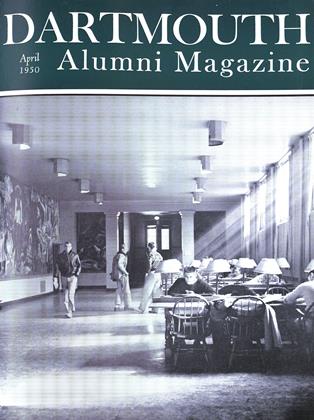by Marshall Schacht '27. Twayne Publishers, Inc., 1949; 63 pages;$2.25.
Friends o£ Mr. Schacht and admirers of his poetry have waited a long time for this book but it is worth waiting for. Fingerboard is announced as the winner of the Twayne First Book Contest of 1949, and it comes from the press with an introduction by Professor F. O. Matthiessen of Harvard, but these pleasant facts are secondary to the fact that at last it is possible to get a selection of Mr. Schacht s poetry without having to run through anthologies and magazines, and decidedly secondary to the fact that here is poetry of great distinction.
The poems in Fingerboard are short poems for the most part (as Mr. Schacht says, "The picture's smallness makes it none the less") and they are poems o£ such concentration, such clearness in the picture and precision in the wording, that they are likely to trap the careless reader into thinking that he has got the whole thing at a glance. He almost certainly hasn't. For the poems go deeper than they seem to; successive readings reveal level on level of significance—and more and more sides to Mr. Schacht. Whether he is writing of the man on the train who rides " to Scarsdale in a green plush seat Between two landscapes walled with speed and snow," or of Emily Dickinson, in what is probably the most widely anthologized of his poems: "Flavor the speaking of this one, The jointed quatrains like a bird," or of a woman— " like a grey birch tree Who takes the sea wind in a birch's way And stoops to earth, accepting wind and rain, Then, without Wordsworth, rights herself again." or of the Cancer Home: "If this is the gate, and this is the gate, of death— A small suburban house on Townsend Street Where I have come to see my father off To where he didn't plan to go but must...."
—Mr. Schacht's account of his experience is direct, intense, and memorable, without strain or flourish. Again and again the reader finds himself responding with that mingled sense of recognition and surprise that is a basic and thrilling part of the encounter with genuine poetry.
In setting the poems range from city to country and back to city. More than one poem has for its theme the insulation of man against his fellows:
"All speech is dark and walking up a hill Beside a stranger who is standing still, Who cannot hear and has no time to grieve."
But quotation does little service to Mr. Schacht. His poems should be read in their entirety.
 View Full Issue
View Full Issue
More From This Issue
-
 Article
ArticleIS TITO COMMUNISM'S LUTHER?
April 1950 By JOHN CLINTON ADAMS, -
 Class Notes
Class Notes1918
April 1950 By ERNEST H. EARLEY, DONALD L. BARR, RICHARD A. HOLTON -
 Article
ArticleTHE COLLEGE
April 1950 By C.E.W. -
 Class Notes
Class Notes1905
April 1950 By ROYAL PARKINSON, GILBERT H. FALL, FLETCHER A. HATCH -
 Class Notes
Class Notes1923
April 1950 By TRUMAN T. METZEL, COLIN C. STEWART 3RD, LEON H. YOUNG JR. -
 Class Notes
Class Notes1929
April 1950 By F. WILLIAM ANDRES, EDWIN C. CHINLUND, GEORGE B. REDDING
KENNETH A. ROBINSON
-
 Article
ArticleMAY 3, 1923
June, 1923 By Frank L. Janeway, Francis J. Neef, William K. Wright, 3 more ... -
 Books
BooksFACULTY PUBLICATIONS
DECEMBER 1926 By Kenneth A. Robinson -
 Books
BooksTHE FIRST CENTURY OF AMERICAN LITERATURE
October 1935 By Kenneth A. Robinson -
 Books
BooksTHE TELEPHONE BOOTH INDIAN
May 1942 By Kenneth A. Robinson -
 Books
BooksTHE LONELY CRO WD: A STUDY OF THE CHANGING AMERICAN CHARACTER
April 1951 By KENNETH A. ROBINSON -
 Books
BooksCONTEMPORARY DRAMA, ELEVEN PLAYS, AMERICAN, ENGLISH, EUROPEAN.
June 1957 By KENNETH A. ROBINSON
Books
-
 Books
BooksFACULTY PUBLICATIONS
MARCH, 1928 -
 Books
BooksNotes on a rival of matrimony: the compromises, betrayals, and felicities of translation.
February 1977 -
 Books
BooksROOSEVELT AND THE RUSSIANS
December 1949 By Charles B. McLane '41 -
 Books
BooksIntroduction to the Study of Public Administration
FEBRUARY, 1927 By Harold R. Bruce -
 Books
BooksAMAZING BUT TRUE: STORIES ABOUT PEOPLE, PLACES, AND THINGS.
MAY 1973 By JOHN HURD '21 -
 Books
BooksAmerican Democracy and Asiatic Citizenship
April 1919 By L. D. WHITE

